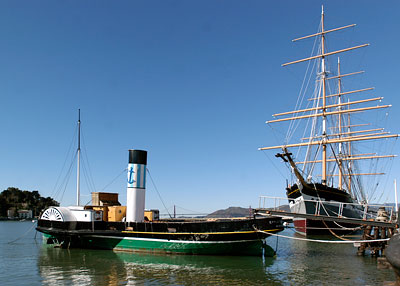San Francisco Points of Interest
Hyde Street Pier
San Francisco Maritime National Historical Park
Built 1914
Eppleton Hall, an English paddlewheel tugboat, is the only intact example of a River Tyne paddle tug, and one of only two surviving British-built paddle tugs. She was built in 1914 by Hepple and Company of South Shields for the Lambton and Hetton Collieries and named after the Lambton family's ancestral home near Penshaw.
A once numerous type of steam powered side wheeler with surface condensing side-lever engines known as Grasshopper engines, she was designed to tow ocean-going coal-carrying ships to and from Tyne Dock, which served Newcastle upon Tyne. For sailing ships this saved time, while for larger motor vessels it saved navigation and pilotage costs. She was also used to tow newly-built ships out to the North sea. Her designed speed was 12 Knots, and her engines could function independently of each other to aid maneuverability.
She served for half a century. In 1964, along with her near sisters Seaham and Reliant, she was one of the last three steam paddle tugs decommissioned in the River Tyne.
In 1967, she was sold for scrap and left sitting on a mud bank in Dunston. As part of the scrapping process her wooden afterdeck and interior were destroyed by fire prior to being broken up.
She was purchased by the San Francisco Maritime Museum and Restored at Bill Quay, Sunderland, from 1969-1970. She was modified to enable her to cross the Atlantic Ocean under her own steam, requiring the fitting of modern navigational aids, radio, an enclosed wheelhouse and conversion from coal to diesel oil.
She made the journey to San Francisco via the Panama Canal and passed under the Golden Gate bridge in March, 1970.
Scott Newhall, who was then editor of the San Francisco Chronicle, wrote the book The Eppleton Hall, which tells the story of the discovery and restoration of the ship, and the journey from the Tyne to San Francisco. (Howell-North Books, Berkeley, CA, 1971).
Excerpted from Wikipedia.

Aquatic Park and Vicinity
- Pumping Station No. 2, Van Ness Avenue
- Aquatic Park Historic District
- Site of the First Ship into San Francisco Bay
- Ghirardelli Square, North Point at Larkin
- Haslett Warehouse, 680 Beach Street
